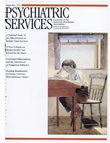Effects of psychosocial rehabilitation for hospitalized mentally ill homeless persons
Abstract
The effectiveness of a psychosocial rehabilitation program in preventing further hospitalization among a group of hospitalized severely mentally ill homeless persons in Israel was evaluated. The program includes inpatient and community residential phases designed to help the participants gradually become more independent. All clients (N = 98) discharged from the inpatient phases to supervised or independent community residences since 1982 were followed until December 31, 1992, to determine changes in hospitalization rates. The average follow-up time was six years. The percentage of time clients were hospitalized dropped from 64.9 percent before discharge to the community residences to 12 percent between discharge and follow-up.
Access content
To read the fulltext, please use one of the options below to sign in or purchase access.- Personal login
- Institutional Login
- Sign in via OpenAthens
- Register for access
-
Please login/register if you wish to pair your device and check access availability.
Not a subscriber?
PsychiatryOnline subscription options offer access to the DSM-5 library, books, journals, CME, and patient resources. This all-in-one virtual library provides psychiatrists and mental health professionals with key resources for diagnosis, treatment, research, and professional development.
Need more help? PsychiatryOnline Customer Service may be reached by emailing [email protected] or by calling 800-368-5777 (in the U.S.) or 703-907-7322 (outside the U.S.).



